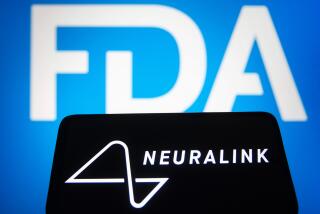Artificial Heart Urged for Transplant Center Use
- Share via
GAITHERSBURG, Md. — A U.S. Food and Drug Administration panel Wednesday recommended that the federal government for the first time grant general approval for transplant centers nationwide to use an artificial heart.
The CardioWest Total Artificial Heart by SynCardia Systems would be the first on the market if the panel’s recommendation is followed by the FDA. The agency usually agrees with the advice of its expert panels.
The FDA advisors said the CardioWest replacement heart kept patients alive, but should only be used in dire situations because of a high rate of side effects such as infection, seizure, stroke and bleeding.
“This is not something any of us would subject ourselves to unless we were dying,” said panelist Judah Weinberger of Columbia University. But, he added, “I think this likely has net benefit to the patient.”
Privately-held SynCardia is seeking approval to use the device as a temporary fix before transplants for heart failure patients with fewer than 30 days to live. Because it requires a large computerized console to regulate blood flow, it can only be used in hospitals.
Five million Americans have failing hearts, and 100,000 are sick enough for a transplant. Only about 2,100 of the 3,800 on the waiting list in 2002 received transplants. Up to a quarter of the patients on the list die while waiting.
Mechanical pumps called left ventricular assist devices can take over, but often can’t maintain full heart function, and 30% to 40% of patients on the devices die before transplant.
The CardioWest heart takes over completely, and is better at maintaining blood pressure and supplying oxygen to organs, said Dr. Marvin Slepian, president and chief executive officer of Tucson, Ariz.-based SynCardia.
The committee debated who should get the devices, but most agreed it should be people facing imminent death and who wouldn’t benefit from the left assist devices.
Slepian estimated that several hundred patients per year would receive the device.
The device’s costs -- $80,000 to $100,000 for the heart, plus hospital and surgery expenses -- aren’t covered by insurance. FDA approval should bring some coverage, Slepian predicted.
Another company, Abiomed Inc., hopes to win FDA approval of its artificial heart, called AbioCor, by the second half of 2004. Unlike SynCardia’s device, the AbioCor is completely implanted.





